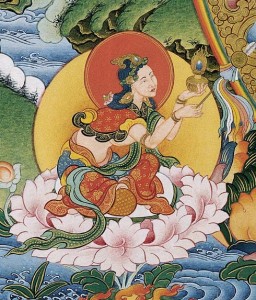The following is from “How to Follow a Spiritual Master” – According to the Vinaya:
We should first request and receive the pure precepts or vows from him and further make abundant offerings, honouring him at all times with out body, speech and mind. The three hundred verses of the precepts of novice give us step-by-step guidance on correct behaviour.
In the morning, we should arise before our Master, wash and make prostrations to the Buddhas, our Master and recite prayers until daybreak. Then we should visit our Khenpo and knock quietly, prostrating whilst entering, enquiring about his well-being. We should further enquire what kind of activities we should have in the morning.
We should keep his residence clean, prepare all toiletries for his bath, as well as laying out all he needs, washing his begging bowl and so on. We should serve him so as to avoid letting him become tired. We should prepare the mandala offering and receive his teachings. In all activities of our three doors, we should have respect according to Vinaya monastic rules. In spare time, we should endeavor to practice meditation and study earnestly. In the evenings, prostrations to the stupa, teachers and supreme objects of virtues, should be performed. The Master’s feet should be cleansed with clean water. We should enquire what we should do during the night and follow his instructions without falling asleep at that time.
Usually when we are close to our Teacher, we should get up immediately when he stands, when he is sitting we should enquire what he needs, providing according to his wishes. When we go as his attendant, we should not precede him as we are showing our back to him. If we walk behind him we should not step on his footprint. We should not step over the shadow on his right but walk to his left slightly behind.
However, if there is some danger about, we can precede him. We should not step over his seat nor use his means of transport (horse, vehicle etc.).
We should always take care to keep our vows pure following our Master with respect from three doors avoiding disrespect such as not rising when the Master does so. When the Master is seated, we should seek a lower seat, not standing, behaving calmly and humbly. During alms round we should not go ahead nor stand on the right of the Master but follow him behind on his left. Among the few possessions we are allowed to keep through Lord Buddha’s instruction we should offer the best to our Master without stinginess.
Whatever we do for our Master, we should do so out of pure respect not arising out of pretension, disinterest nor grudgingly. Such impure motivations are not in accordance with the teachings and they are not genuine. The sole purpose of the above is to make our Master happy.
By making our Master happy though we are not benefiting him nor rendering a service to him. However we have many opportunities to accumulate merit, cleanse our bad habits and tame the wildness of our mind. Henceforth this behavior is very beneficial for us and lays the foundation for he growing of trust and respect.
As time progresses, these two qualities in turn will naturally develop into faith and devotion and form the support required from our side for the pouring of blessings. In this context, our self-centered society has lost any means to even understand the concept or even the need for respect, rendering service to others even less honouring. Instead, we are constantly focusing our our personal needs, emotions, and well-being. No wonder that, since everyone is pursuing the same type of ideals, we experience ever-increasing conflicts, first in the wildness of our untamed mind, in the relationship between close and distant families, social classes, work colleagues and even nations. When the only means of focus is self-interest and increase in personal gains, whatever kind they may be, conflict is never far away. Thus, the first step in training of the mind is that of basic re-learning process of respect through the recognition of our Master’s qualities, qualities we do not possess ourselves as yet but we feel are worthy of emulating.
In essence, the teacher we meet is the result of the quality of our view and the consequence of our past karma. There was once an illiterate man with great faith in the dharma and his Master who was sitting at the back of the monks during prayers. As he could not read or even fully understand all which was recited, he used to pray very simply, may I too accomplish whatever they are saying. And so, through the power of his devotion his short prayer bore fruit.
and further:
The best way to serve him is to dedicate our life to practice and uphold the teachings.
The next best way is to serve him in body and speech that will cleanse our obscuration.
Lastly we should make offerings to him that allows us to perform the two accumulations.
